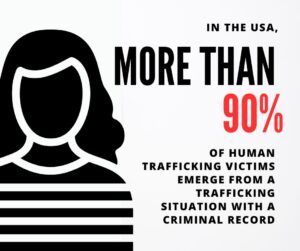
Human trafficking (HT) is widely regarded as one of the most undetected and underreported crimes globally. It exploits millions worldwide, stripping individuals of their freedom and dignity. Central to combating this scourge is the unwavering support for survivors, whose resilience and courage inspire the global fight against exploitation. Collaborating with anti-HT organizations is essential in providing survivors with the resources and opportunities they need to rebuild their lives.
There are many nonprofit organizations created to help in the fight against HT and they are each focused on a particular facet of the entire HT ecosystem. Some, like the Anti-Human Trafficking Intelligence Initiative (ATII),1 are strong in offering evidence and data to take down traffickers. Others, like the National Human Trafficking Hotline,2 provide awareness and empower the public to take action by calling into a tip line. Equally important, there are organizations like Polaris’ World Without Exploitation3 and Destiny Rescue4 that focus on supporting survivors after they are taken out of trafficking networks.
Survivors of HT endure profound physical and psychological trauma. Effective and consistent support systems must prioritize their unique needs, ensuring access to comprehensive services such as medical care, psychological counseling, legal assistance and vocational training. According to the Safe House Project, survivors of HT and exploitation have an 80% chance of being revictimized if they do not have a safe place to go.5 Reclaiming autonomy and purpose is key.
Megan Lundstrom, director of the Polaris Resilience Fund, emphasizes the significance of meeting survivors where they currently stand, “We are focused on meeting survivors where they are—with programming and initiatives that will be cocreated by survivors so that the viability and actual outcomes will be beneficial to the betterment of their quality of life.”
Supporting Survivors Is Best Accomplished by Knowing Their Unique Needs
Economic independence is a cornerstone of recovery for survivors. Vocational training and employment opportunities enable individuals to support themselves and their families, reducing vulnerability to re-exploitation. On paper, this sounds like an easy task for most people. But when an HT survivor tries something as simple as opening a bank account, they may face numerous challenges due to the aftermath of their exploitation. Here is an example scenario:
Scenario: Maria, a survivor of sex trafficking, wants to regain financial independence and rebuild her life. She visits a bank to open an account. These are the challenges Maria faces at the bank:
- Lack of Identification Documents:
Maria was trafficked across borders and had her passport and identification stolen by her traffickers. Without these essential documents, the bank cannot verify her identity, a standard requirement under anti-money laundering and know your customer regulations. - Fraudulent Credit History:
While Maria was under the control of her traffickers, they used her name to open fraudulent accounts, max out credit cards and rack up debts. When the bank runs a credit check, her score is flagged as poor, making her appear as a high-risk customer. - Fear and Mistrust:
Maria struggles to communicate her situation to the bank staff. She fears judgment or being reported to authorities due to her past, especially if she is undocumented or still traumatized from her experience. - Lack of Financial Literacy:
Having been deprived of financial autonomy, Maria has little knowledge about banking systems, account types or managing money. This can make the process overwhelming, especially without adequate support or guidance. - Limited Survivor Support Programs:
If the bank does not have partnerships with anti-trafficking organizations or survivor-specific financial programs, Maria might not receive the specialized assistance she needs, leaving her discouraged and unable to access basic financial services.
Despite significant progress, challenges remain in supporting survivors. As shown in Graphic 1, more than 90% of HT victims in the U.S. emerge from a trafficking situation with a criminal record.6 Stigma, lack of resources and legal obstacles can impede recovery and reintegration.
Graphic 1: HT Victims in the U.S. Usually Also Have Criminal Records
Visualization by: Jennifer Moreau. Source: Polaris.7
Recognizing and addressing the challenges survivors face is essential for companies and organizations aiming to provide meaningful support. Survivor-led initiatives play a critical role in bridging the gap between those seeking help and those offering it, ensuring that assistance is both effective and impactful. As Jenny Footle, an artist, activist and entrepreneur in the anti-trafficking movement explains, “Survivor leaders often have significant historical and financial trauma, are from systematically oppressed groups, and are overcoming intense abuse of power.” With this in mind, partnerships must incorporate survivor leaders into their work with great care in their approach.
Nonprofit partnerships must approach the incorporation of survivor leaders with great care, ensuring their efforts are rooted in respect, consent and empowerment. One critical aspect is being mindful of how survivors' stories are used to illustrate different trafficking experiences. While sharing these stories can raise awareness and drive meaningful change, it is essential to avoid exploitation or re-traumatization. Organizations should prioritize informed consent, allow survivors to control how their narratives are shared and ensure that storytelling uplifts rather than objectifies. By fostering a trauma-informed and survivor-centered approach, we can authentically elevate survivor voices while maintaining dignity and safeguarding their well-being.
Conclusion
By partnering with anti-HT organizations, individuals and communities can contribute to a global movement that empowers survivors, dismantles trafficking networks and fosters a world where freedom and dignity are upheld for all. Individuals and corporations looking to make a difference can focus on the aspect of HT that aligns most closely with their passion—whether it is education, raising awareness, providing survivor housing, offering job training, dismantling trafficking networks or other impactful areas.
As we continue to learn from survivors' experiences and insights, let us honor their resilience by advocating for justice, providing unwavering support, and working together to eradicate HT in all its forms.
Jennifer Moreau, director, Marketing & ESG Advisory, Anti-Human Trafficking Intelligence Initiative, Jennifer@FollowMoneyFightSlavery.org, ![]()
- “Anti-Human Trafficking Intelligence Initiative (ATII) homepage,” ATII, https://followmoneyfightslavery.org/
- “National Human Trafficking Hotline,homepage,” National Human Trafficking Hotline, https://humantraffickinghotline.org/en
- “World Without Exploitation homepage,” World Without Exploitation, https://www.worldwithoutexploitation.org/
- “Destiny Rescue homepage,” Destiny Rescue, https://www.destinyrescue.org/
- “Safe House Project homepage,” Safe House Project, https://www.safehouseproject.org/
- “Criminalizing Victims: Trafficking Survivors With Criminal Records Deserve Relief,” Polaris, August 15, 2022, https://polarisproject.org/blog/2022/08/criminalizing-victims-trafficking-survivors-with-criminal-records-deserve-relief/
- Ibid.











